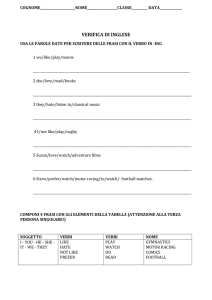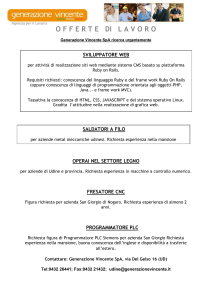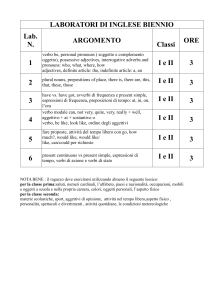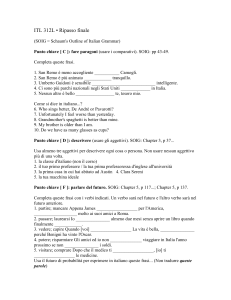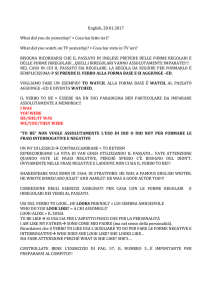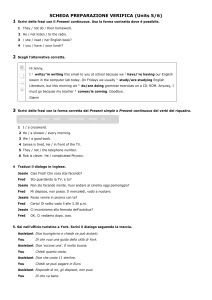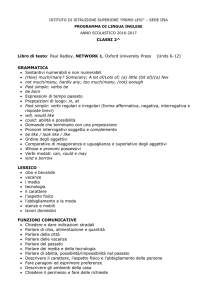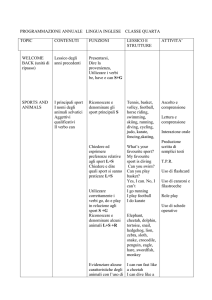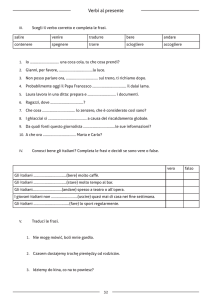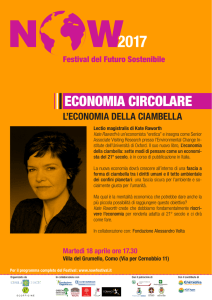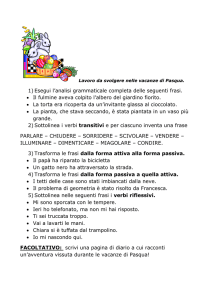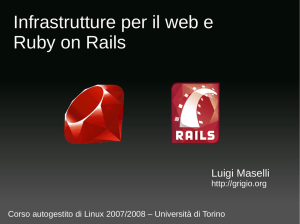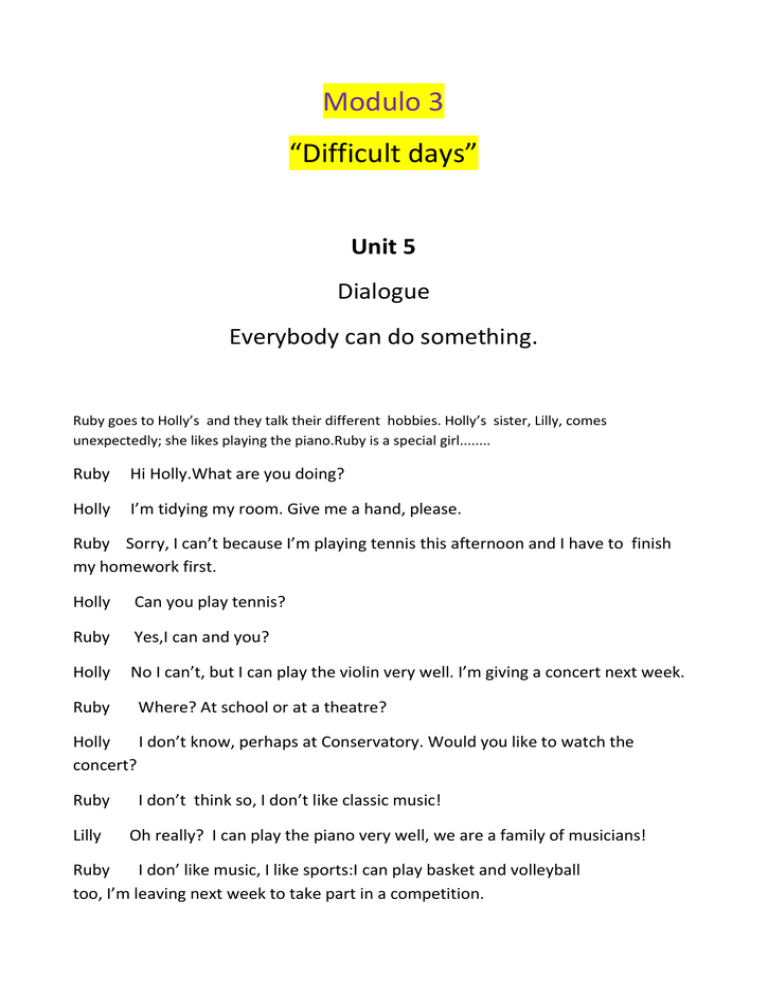
Modulo 3
“Difficult days”
Unit 5
Dialogue
Everybody can do something.
Ruby goes to Holly’s and they talk their different hobbies. Holly’s sister, Lilly, comes
unexpectedly; she likes playing the piano.Ruby is a special girl........
Ruby
Hi Holly.What are you doing?
Holly
I’m tidying my room. Give me a hand, please.
Ruby Sorry, I can’t because I’m playing tennis this afternoon and I have to finish
my homework first.
Holly
Can you play tennis?
Ruby
Yes,I can and you?
Holly
No I can’t, but I can play the violin very well. I’m giving a concert next week.
Ruby
Where? At school or at a theatre?
Holly
I don’t know, perhaps at Conservatory. Would you like to watch the
concert?
Ruby
Lilly
I don’t think so, I don’t like classic music!
Oh really? I can play the piano very well, we are a family of musicians!
Ruby
I don’ like music, I like sports:I can play basket and volleyball
too, I’m leaving next week to take part in a competition.
Lilly
I don’t believe it! Who are you leaving with?
Ruby
With my team, my instructor and my parents, of course.
Holly
Hurry up, if you are playing tennis this afternoon.
Lilly
Phone me this evening, let me know. Good luck Ruby.
Ruby
You too, Lilly. Bye.
Holly and Lilly
Bye.
Check it out!
Grammar Spot
Give me a hand=dammi una mano.
I don’t think so=penso di no.
Oh really?=davvero?
I don’t believe it=non ci posso
credere!
What ? = che cosa
Where ?= dove?
Hurry up=affrettati.
Would you like ? = ti
piacerebbe,vorresti?
Let me know=fammi sapere.
Who…. With ? = con chi?
Good luck=buona fortuna.
After reading the dialogue,answer the questions:
1) Who is Lilly?=
2) What does she like?=
3) What is Holly doing?=
4) Does Ruby like music?=
5) What does she like?=
6) Is Ruby leaving alone?=
7) Do you like classic music?
8) Can you play a musical instrument?=
9) Do you go to concerts?=
10) Do you like sport?=
Grammar
“Can”: forme e usi.
Forma
affermativa
You can
Forma
negativa
You can’t
Forma
interrogativa
Can you?
Short answers
affermative
Yes you can
Short answers
negative
No you can’t
We can
We can’t
Can we?
Yes we can
No we can’t
You can
You can’t
Can you?
Yes we can
No we can’t
They can
They can’t
Can they?
Yes they can
No they can’t
Can è il presente del verbo ausiliare modale che significa potere:
< can rimane invariato in tutte le persone;
< è sempre seguito da un infinito senza “to” (forma base);
< le forme interrogative e negative si formano come per il verbo essere (can è un
verbo ausiliare).
Can ha i seguenti significati:
1) possibilita’ Marco can stay in England for 3 months=Marco puo’ stare in
Inghilterra per 3 mesi.
2) capacita’ I can’t see very well from here=non riesco a vedere molto bene da qui.
3) abilita’
Can you play the guitar?=Sai suonare/Sei capace di suonare la chitarra?
4) richieste,permesso Can I use your car?-Of course,you can=Posso usare la tua
macchina?-Certo che puoi.
Degrees of ability
She can act very well=lei sa recitare molto bene.
I can’t play the guitar at all!=io non so suonare completamente la chitarra!
I can play the piano
very well
+++
I can play the piano
well
++
I can play the piano
quite well
+
I can’t play the piano
very well
-
I can’t play the piano
at all
--
Why…?/Because...
Why is Ruby angry? Because her uncle isn’t at the auditions.
Why si usa nelle domande,per chiedere qualcosa, because nelle risposte,per dare
spiegazioni.Corrispondono all’italiano “ perché”?
Present continuous -Il Futuro
“Il present continuous” è usato anche per parlare di azioni future certe o
programmate.E’ accompagnato dalle seguenti determinazioni di tempo futuro:
this evening,week,month,year=questa sera,settimana,mese,anno;
tomorrow morning,afternoon,evening=domani mattina,pomeriggio,sera;
next weekend,year,Monday=il prossimo fine settimana,l’anno prossimo,lunedi’
prossimo;
on,seguito da un giorno della settimana,dal nome di un mese;
tomorrow=domani;
tonight=stasera.
Written exercises.
1) Completa le seguenti frasi con “can”:
- My friend Paul ----- play the guitar.
- ----- you drive a horse?
- -----George play basketball?
- You-----close the window if you are cold.
- We -----go out this afternoon.
2) Completa le seguenti frasi con “can” oppure “can’t”:
- I -----cook but my sister -----.
- Someone is at the door.-----I open it?
- -----I use your bathroom,please?
-I-----leave without my coat.
- You-----smoke here!
3) Osserva la tabella e completa la colonna YOU.Poi scrivi frasi complete su quello
che sapete e non sapete fare.Usa CAN e CAN’T.
Mark
Ride a horse
Play the violin
Cook Italian food
Ski
Swim
X
V
X
V
X
N.B.: x=frase negativa;V=frase affermativa.
1) Mark/ride a horse=
2) Mark/play the violin=
Fiona
V
X
X
X
X
You
3)Fiona and Mark/cook Italian food=
4)Mark/ski=
5) Mark and Fiona/swim=
4) Traduci in inglese le seguenti frasi:
- Sai parlare in inglese?
- Puoi ripetere lentamente?
- Io non posso venire alla tua festa.
- Non riesco a trovare il mio borsellino.
- Potete entrare:la porta è aperta.
5) Scrivi una frase per ogni attivita’ seguente,dicendo quanto sei bravo.
sing:_______________________________________________
play chess:__________________________________________
swim:______________________________________________
ski:________________________________________________
6) Completa con why o because
- ………. are so sad? ............I can’t go out with my friends.
- ………..are you so tired?..........I work hard.
- …………are late this evening?.................I haven’t got my car.
- I’m nervous. …………….? ……………..I don’t find my wallet.
- ………….do you go to Rome?..............I go to see my sister Jane.
7) Componi delle frasi con le parole date,usando la forma del futuro al “present
continuous”.
- My parents/leave/next Monday.
- They/play football/this afternoon.
-Paul/have a Maths test/next Friday.
- What /Jake/do/next Monday evening?
- Ruby/go to school/this week.
8) Scrivi 5 frasi in inglese riguardanti la tua vita personale. Usa il futuro al “present
continuous” e gli avverbi di tempo studiati in questa unit.
a)___________________________________________________________________
___________________________________________________________________
b)___________________________________________________________________
_____________________________________________________________________
c)___________________________________________________________________
___________________________________________________________________
d)___________________________________________________________________
____________________________________________________________________
e)___________________________________________________________________
____________________________________________________________________
Unit 6
Dialogue
Are there any tomatoes?
Tom and Shiv are at Kate’s house.
Shiv I’m hungry .Is there any food in the fridge, Kate?
Kate Hmm! Yes ,there is, but there isn’t much. There is some ham on
the table and there is some bread.
Shiv
Yes, ok .Are there any tomatoes?
Kate
No, there aren’t. There’s some lettuce behind the shopping bag.
Shiv
Yuck! I hate lettuce. Is there any cheese?
Kate
No, there isn’t. There are some carrots in the package in the
cupboard, but there aren’t many. Go to the supermarket in front
of the bookshop , buy some cheese and any other thing you like.
Shiv
That’s ok. Give me the money.
Kate
Shiv, you are unbearable! Take my bag and my purse and take
the money you need; hurry up and come home as quick as
possible.
Shiv
Kate, I can’t find your purse!
Kate
Shiv!!!If you can’t find the money, eat some bread and ham,
otherwise ,eat what there is in the house.
Shiv
No,I don’t like bread and tomatoes. What about you,Tom
are you hungry?
Tom
No, I’m not hungry, thanks.
Shiv
You aren’t hungry! How come?
Tom
I feel sick. I’m going to bed. Perhaps I have the flu.
Shiv
So, what shall I do?
Kate
Ham, lettuce and bread, it’s easy!
Shiv
Well said, Kate!
Kate
Thank goodness!
Check it out !
Grammar spot
I’m hungry=ho fame.
There is=c’é.
Yuck!= che schifo!
There isn’t=non c’é.
Any other thing=qualunque altra cosa.
Hurry up=affrettati.
Is there?=c’è?
Some=un po’ di.
Any=del,della,dei,delle.
As quick as possible=il piu’ presto possibile.
Go=vai.
What about you,Tom=e tu Tom?
I’m not hungy=non ho fame.
Buy=compra.
Give me=dammi.
How come?=come mai?
Eat=mangia.
Well said=ben detto.
What=cio’ che.
Thank goodness!=grazie a Dio
What shall I do?=che devo
fare?
After reading the dialogue, answer the questions:
1) Where are Tom and Shiv?=
2) What is there in the fridge?=
3) What is there on the table?=
4) Does Shiv like lettuce?=
5) Where is the supermarket?=
6) What Shiv doesn’t find?=
7) What does Kate tell him to eat?=
8) Why isn’t Tom hungry?=
9) What is he doing?=
10) What does Shiv decide to eat at the end?=
Answer the personal questions.
11) Do you like tomatoes?=
12) What do you like eating at lunch?=
13) And in the evening?=
14) What time do you have breakfast?=
15) Do you like cooking?
Activities
1) List all the words connected to food in the dialogue:
2) List all the verbs in the affirmative form:
3) List all the verbs in the negative form:
GRAMMAR
Preposizioni di luogo
Le seguenti preposizioni indicano dove si trovano oggetti e persone :
In =in, nello, nella, nelle, ecc.,
On=su, sopra (indica contatto con un oggetto),
Under=sotto,
Behind=dietro,
Near=vicino a (non indica contatto ma vicinanza),
On the corner of.........and......... (all’angolo di…….e……),
On the left/right=a sinistra/a destra,
Opposite=di fronte a,
Between=fra,
In front of=davanti a,
Next to=accanto a (indica contatto).
Esempi:
1. The book is on the table=il libro é sul tavolo.
2. The cat is under the armchair=il gatto é sotto la poltrona.
3. The window is between the bed and the desk=la finestra é fra il letto e la
scrivania.
There is/There are
Forma affermativa
1) There is= c’é (quando segue un nome singolare),
2) There are=ci sono (quando segue un nome plurale).
Forma negativa
1) There isn’t= non c’è,
2)There aren’t=non ci sono.
Forma interrogativa
1) Is there?= c’è?
2) Are there?=ci sono?
Some/Any
“Some,any” sono articoli partitivi;corrispondono all’italiano
“del,dello,della,dei,delle”,ecc. L’uso dell’articolo partitivo in inglese è
obbligatorio;nella lingua italiana si puo’ omettere e sottintendere.
Some: si usa nelle frasi affermative e in quelle interrogative che esprimono
un’offerta.
Esempi: 1) There are some pencils on the desk=ci sono delle matite sulla scrivania.
2) Would you like some coffee?=vorresti del caffé?
Any: si usa nelle frasi negative e in quelle interrogative vere e proprie, cioé quando
chiedo una cosa che ignoro.
Esempi: 1) I haven’t got any money=Non ho soldi,
2) Have you got any pets?= Hai animali domestici?
L’imperativo
Forma affermativa=corrisponde alla forma base del verbo.
Forma negativa=si ottiene premettendo don’t alla forma base del verbo, anche
con il verbo “essere”.
Esempi: Paul,study more!Open your book and read!
Paul,don’t go out this evening; it’s raining.
Written Exercises.
A) Completa le seguenti frasi:
1) ↕
☺↕
The face is ...........the two arrows.
2) ↕☺
The face is ……….the arrow.
3) ↕
The face is ……………the arrow.
☺
4) ↕
☺
5) ☺
The face is ……….the arrow.
The face is ………..the arrow.
↕
6) ()
The face is ……….the brackets.
7) ( )
The face is…………….of the brackets.
()
The face is……………of the brackets.
8)
B) Inserisci “there is” oppure “there are”negli spazi;volgi al negativo le stesse frasi.
1)…………….two cats in the garden=
2)…………….is a dog near the school=
3)……………some ladies in that supermarket.
4)…………….many lawyers in town.
5)………………there are five days in a week.
6)…………..drinks in the fridge.
C) Inserisci “is there” oppure “are there”negli spazi.
1)……………….a cat in this room?
2)……………….any students at school?
3)…………………a doctor?
4)………………..any shops in this street?
5)………………a great movie on tv tonight?
6)……………..a grammar book?
D) Inserisci la giusta soluzione negli spazi,scegliendo fra “some”o “any”.
1) I need..............money.
2) Would you like ……………….coffee?
3) I haven’t got…………pets.
4) Is there …………cake in the kitchen?
5)There is …………tea in the cup.
6)Are there ……..pens on the table?
E) Completa le frasi seguenti mettendo i verbi fra parentesi all’imperativo,
affermativo o negativo.
1) The water’s boiling. ...............(put ) some salt in it!
2) ……………..( touch ) that dog! It can be dangerous.
3)………………..( be ) late for dinner!
4) Jack,……………( come ) in and……………( take) a seat.
5) ………( tell) me what happened.
6)…………..( open ) your books,students.
F) traduci in inglese le frasi seguenti:
1) Ci sono molte persone al cinema=
2) Vorresti del caffè?=
3) Non uscire stasera: studia e vai a letto presto=
4) Non ci sono negozi in questa strada; ci sono due negozi vicino alla posta=
5) C’è una matita sotto la scrivania: prendila=
6) Ci sono due bottiglie sul tavolo: mettile nel frigo=
7) Dove sono i miei occhiali? sono nel cassetto=
8) Non c’è frutta: comprala=
9) Il vestito nuovo è nell’armadio=
10) Non vedo ragazzi a scuola. Dove sono?=
G) Elenca, in inglese, quello che c’è nella tua stanza e quello che non c’ é.Usa
“a,an,there is,there are,some,any” (Max 5 righi).
_____________________________________________________________________
_____________________________________________________________________
_____________________________________________________________________
_____________________________________________________________________
H) What does your town offer? Write a brief description of your town (50 words).

